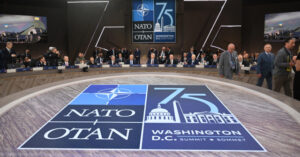The launch of the experimental supersonic Oreshnik experimental supersonic missile by Russia against the Ukrainian city of Dnipro last Thursday caused international concern and led to an emergency meeting of the ambassadors of NATO and Ukraine in Brussels today.
Russian President Vladimir Putin said the attack was in retaliation for US and British-made missile launches from Ukraine against Russian targets. At the same time, he warned that Russia now considers strikes on military facilities of countries that allow Ukraine to use their weapons to be justified. Ukrainian President Volodymyr Zelensky condemned the use of the experimental missile, calling it an “international crime” and called on the West to immediately strengthen Ukrainian air defense systems to counter the new threat.
Low Expectations for Decisions at the Summit
The convening of the NATO-Ukraine Council aims to assess the escalating tensions in the region and consider ways to strengthen Ukrainian defenses. However, diplomats and NATO officials say, according to international agencies, that the chances of major decisions are limited. The most likely outcome is expected to be a reiteration of the alliance’s commitment that the deployment of the new Russian weapon will not deter NATO members from continuing to support Ukraine.
A NATO official said the meeting provided an opportunity to discuss the current security situation in Ukraine and included video updates from Ukrainian officials.
Questions about Western support under Trump
The escalating tensions come at a time when questions are being raised about the future of Western military aid to Ukraine following Donald Trump’s re-election. The new US president has expressed doubts about maintaining Washington’s heavy military support to Kyiv while pledging to push for a quick deal to end the war.
Admiral Rob Bauer, NATO’s top commander, said Monday that he “cannot imagine it is in the interest of the United States to let Putin emerge victorious from any negotiations.”
NATO: Adapting to War Scenarios
On the battlefield, Ukrainian forces are struggling to stop Russian attacks in the east. At the same time, Admiral Bauer stressed the need to prepare NATO operations for a war scenario, calling on alliance members to increase their defense spending closer to 3% of GDP. This is significantly higher than the current 2% target.
Adapting to the new conditions, according to Bauer, will require an increase in resources and a strengthening of the Alliance’s military readiness.
Ask me anything
Explore related questions





